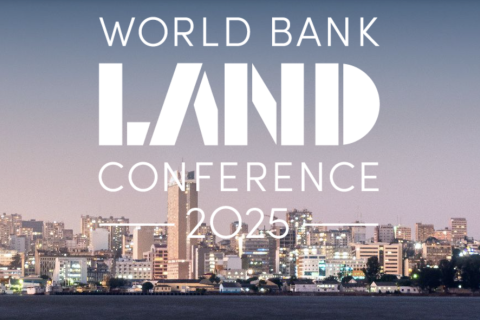Tuesday, May 6
14:00 - 15:30 EST (20:00 - 21:30 CEST)
Location: MC 2-800 & Online
Effective land administration is vital for achieving a just energy transition and building resilience to climate change. Transparency in land use for renewable energy investments, community participation in land decisions, and accountability for land misuse are key components. Yet, corruption in land management—affecting one in five people globally—alongside limited access to transparent land data, poses significant barriers to these goals.
This session will explore the role of transparency and anti-corruption measures in fostering fair and sustainable land governance. Using the State of Land Information Index (SOLIndex) and Corruption Perception Index (CPI) as diagnostic tools, panelists will examine the intersections of land data transparency, corruption, and their implications for climate resilience and equitable transitions.
Through case studies from South America, Africa, and the Western Balkans, the session will highlight practical strategies to improve land governance, including strengthening data accessibility and combating corruption. Participants will gain insights into how these benchmarks can inform decision-making by land, climate, and environmental stakeholders, empowering communities to mitigate injustices and promote sustainable development.
The panel will examine the critical link between transparent land data and the prevention of corruption in land administration, addressing how corruption in land use and allocation disrupts climate resilience and equitable land governance. By exploring both the transparency of land data and renewable energy investments, panelists will discuss how to counter corrupt practices, such as land grabs and misuse of resources, that hinder efforts toward a just energy transition.
The session will discuss how benchmarking land data transparency, with tools like the State of Land Information Index (SOLIndex), can support efforts to improve effective land governance. Understanding the state of land data can offer insights and interventions to strengthen transparency and accountability in land use and a just energy transition. Drawing upon the results and case studies from the 2025 CPI, which will focus on climate change as its yearly theme, and the main recommendations from the Addressing Land Corruption for Climate Justice (2023) report, the session will explore how these findings can inform strategies to address climate-related corruption in land administration, and how data transparency can contribute to this objective.
This session will serve as a multi-stakeholder engagement platform, including government, NGOs, and international organizations. With examples from Latin America, Africa and the Western Balkans, it will explore strategies for governing land access in support of climate-resilient transportation and renewable energy investments, as part of a just energy transition. Participants will leave with practical strategies to strengthen transparency and accountability, including in areas like procurement and community engagement, to reduce corruption and support climate resilience within different contexts.
Speakers
Charl-Thom Bayer
Senior Land Information Specialist
Land Portal
Charl-Thom Bayer is the Senior Land Information Specialist at the Land Portal Foundation, where he spearheads initiatives aimed at democratising land information and leveraging technology to support data driven and evidence-based decision making for good land governance. He advocates for the use of innovative information tools and technologies to promote equitable land development and social justice on a global scale. His time in academia is complemented by practical experience gained in the private sector, government, and civil society where he continues to collaborate with a diverse range of stakeholders to inspire new conversations.
Caleb Johnson
Land Administration Specialist
World Bank Group
Caleb Travis Johnson is a Land Administration Specialist with the Urban ECA unit of the World Bank’s Urban, Disaster Risk Management, Resilience and Land Global Practice. Operations he works on are located in the Western Balkans, Türkiye, and Uzbekistan. Prior to joining the World Bank in December 2015, Mr. Johnson worked on a number of consultancies that promoted international trade in agricultural commodities for small businesses in the United States. Organizations he has consulted for include the U.S. Department of Agriculture, the U.S. Embassy in La Paz, Bolivia, and the Virginia Small Business Development Centers. Mr. Johnson hails from Western New York. He holds a B.A. in International Relations & History from Houghton University and an M.A. in Global Affairs – Governance and Public Management from George Mason University.
Jonathan Ochom
Land Governance Thematic Specialist
Transparency International
Jonathan Ochom is a human rights lawyer with core expertise areas of expertise in land governance, access to justice and legal innovations. Although land is not his only passion, it certainly is the one that drives his career the most. For over 12 years, Jonathan has been behind some of the leading interventions that have
shaped the land sector in Uganda and across Africa through community mobilisation and empowerment, legal aid, research as well as legal and policy reform advocacy.
He is currently the Land Governance Thematic Specialist at Transparency International where he provides expertise on the topic of land governance in the Land and Corruption in Africa II project, supporting project design and implementation, identifying and leading on partnerships, supporting the rollout of the global and regional project advocacy strategy, and generating evidence on the linkages between corruption and land in Sub-Saharan Africa and beyond.
Prior to joining TI, he was the Executive Director of LANDnet Uganda, a technical land organisation where he provided overall strategic and administrative oversight. He has previously worked at Oxfam in Uganda, the Democratic Governance Facility and Uganda Land Alliance. Besides his regular work, Jonathan has also conducted several research, capacity building and strategic planning consultancies with various NGOs in Africa in the areas of land, human rights, pastoralism, gender, etc.
Christelle van den Berg
Regional Manager
Kadaster
Mrs. Van den Berg is regional manager for Kadaster International, where she plays a pivotal role in extending the organization’s expertise to countries undergoing land administration development. Her work involves close collaboration with ministries, embassies, universities, global businesses, and financial partners.
In her position, she manages expert teams across multiple countries and actively participates in the board of the national land administration modernization program in Benin. Mrs. Van den Berg is a prominent representative of Kadaster on both national and international platforms, including the International Federation of Surveyors.
Additionally, she serves as a board member of the Dutch Professional Association for Geo-Information. Mrs. Van den Berg holds a Master’s degree in Forestry and Nature Management. From 2010 to 2016, she was a member of both local and provincial parliaments in the Netherlands, where she was a spokesperson for spatial planning and a new Environmental Act.
Darko Vucetic
Assistant Director for Development and Innovation
Republic Geodetic Authority
Darko Vučetić is the Assistant Director of the Republic Geodetic Authority of Serbia, leading the Development and Innovation Sector. He focuses on improving data management in public institutions and advancing strategic national data use. Since 2022, he has been a member of the UN-GGIM Europe Executive Committee and previously served on the Management Board of EuroGeographics. His efforts have modernized public administration and driven innovation in the public sector.





